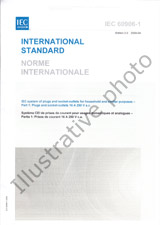We need your consent to use the individual data so that you can see information about your interests, among other things. Click "OK" to give your consent.

IEC/TS 63202-4-ed.1.0
Photovoltaic cells - Part 4: Measurement of light and elevated temperature induced degradation of crystalline silicon photovoltaic cells
Translate name
STANDARD published on 28.6.2022
The information about the standard:
Designation standards: IEC/TS 63202-4-ed.1.0
Publication date standards: 28.6.2022
SKU: NS-1066263
Approximate weight : 300 g (0.66 lbs)
Country: International technical standard
Category: Technical standards IEC
The category - similar standards:
Annotation of standard text IEC/TS 63202-4-ed.1.0 :
IEC TS 63202-4:2022 describes procedures for measuring the light and elevated temperature induced degradation (LETID) of crystalline silicon photovoltaic (PV) cells in simulated sunlight. The requirements for measuring initial light induced degradation (LID) of crystalline silicon PV cells are covered by IEC 63202-1, where LID degradation risk of PV cells under moderate temperature and initial durations within termination criteria of 20 kWh·m-2 are evaluated. The procedures described in this document are to evaluate the degradation behaviour of PV cells under elevated temperature and longer duration of light irradiation. The procedures described in this document can be used to detect the LETID risks of PV cells [2],[3] and to judge the effectiveness of LETID mitigation measures, e.g. quick test for production monitoring, thus helping improve the energy yield of PV modules.
We recommend:
Updating of laws
Do you want to be sure about the validity of used regulations?
We offer you a solution so that you could use valid and updated legislative regulations.
Would you like to get more information? Look at this page.



 Cookies
Cookies
